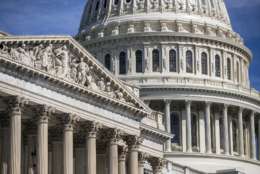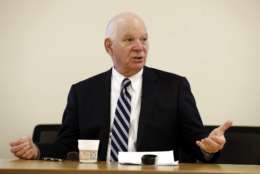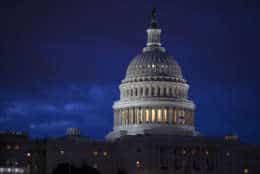federal pay raise
-
There's talk that some kind of raise, either 1.9 percent by some counts or 3 percent as proposed by congressional friends of feds, could be worked out via the appropriation process after the midterm election. If so, it would be exactly the same raise nonpostal feds got last January.
July 24, 2018 -
Federal workers got a 1.4 percent raise in January that was proposed and backed by the president. But the outlook for 2019 was and still is different.
July 24, 2018 -
Do you remember what your work-wise, midsummer nightmares were this time last year? Even if you were on vacation this time last year, chances are you were thankful that the very real shutdown threatened for April didn’t materialize.
July 17, 2018 -
With three months left to go in the cost-of-living adjustment countdown clock, federal/military/Social Security retirees are looking at a January inflation-catch up of 2.7 percent.
July 13, 2018 -
The Senate Appropriations Committee cleared a bill to give federal civilian employees a 1.9 percent pay raise in 2019.
June 22, 2018 -
The Senate Appropriations Financial Services and General Government Subcommittee differed from the president's budget proposal and suggested a pay raise for civilian employees in 2019.
June 19, 2018 -
The House-passed version of the defense authorization act does not include the Trump administration's proposed changes to federal retirement.
May 24, 2018 -
In today's Federal Newscast, bipartisan legislation in the Senate would shorten the deadline for the Defense department to pay defense contractors who work with small businesses.
May 24, 2018 -
If any of the Trump administration’s proposals to overhaul the federal pay and pension plans make it through Congress, thousands of federal workers might have to extend their tours of duty by as much as a decade to maintain their standard of living.
May 21, 2018 -
Some clever, eligible federal workers are considering retiring later this year to be on the retirement roles for the January 2019 cost of living adjustment. But the problem is that time is not on their side.
April 30, 2018 -
The 150-member Republican Study Committee has listed its budget priorities for 2019, calling for eliminating all automatic pay raises for federal workers, and increasing their contributions to their own retirement. The conservative group's also wants to make it easier for federal employees to be fired.
April 27, 2018 -
The Trump administration has been pulling at the Gordian knot of federal employment.
April 20, 2018 -
The American Federation of Government Employees and have endorsed congressional candidates whom they hope will advocate for federal worker pay going forward.
April 20, 2018 -
Senior Correspondent Mike Causey discusses the difference between a pay raise for federal workers and military personnel and a cost of living adjustment, or COLA, for retirees
March 15, 2018 -
Lawmakers have spent the last four weeks finalizing appropriations for fiscal 2018, with the intent of packaging all 12 spending bills into one omnibus.
March 12, 2018















